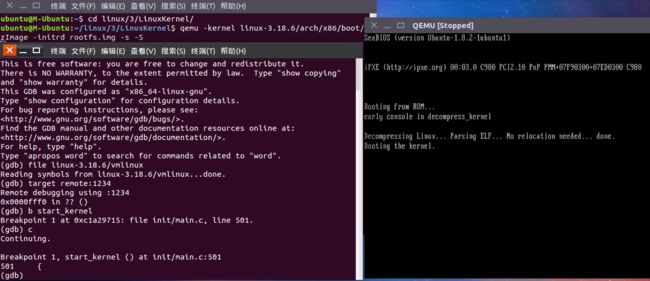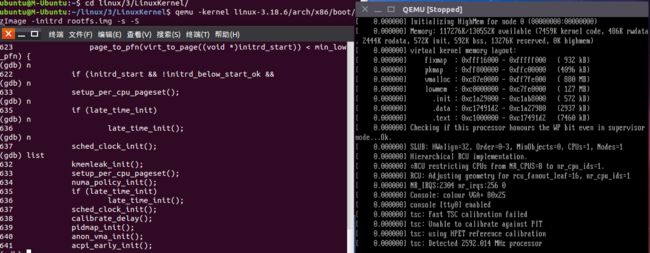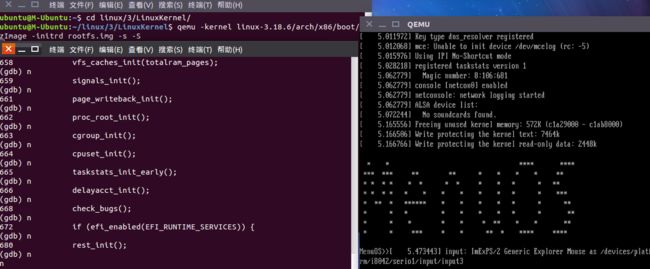实验截图
start_kernel代码分析
asmlinkage __visible void __init start_kernel(void)
{
char *command_line; //地址指针,指向内核启动参数在内存中的位置
char *after_dashes;
/*
* Need to run as early as possible, to initialize the
* lockdep hash:
*/
lockdep_init(); //内核调试模块,用于检查内核互斥机制潜在的死锁问题。
set_task_stack_end_magic(&init_task); //init_task为0号进程的PCB
smp_setup_processor_id(); //查看是否为多处理器平台,获取当前处理器逻辑号,如果是单CPU这个函数什么也不会做。
debug_objects_early_init();//对调试对象进行早期的初始化,其实就是HASH锁和静态对象池进行初始化
/*
* Set up the the initial canary ASAP:
*/
boot_init_stack_canary(); //初始化防止栈溢攻击保护的堆栈
cgroup_init_early(); //初始化进程及子进程性能控制机制
local_irq_disable();//关闭系统总中断
early_boot_irqs_disabled = true;
/*
* Interrupts are still disabled. Do necessary setups, then
* enable them
*/
boot_cpu_init(); //激活当前CPU
page_address_init(); //与高端内存有关未定义为空函数
pr_notice("%s", linux_banner); //打印内核版本信息,内核启动第一行信息来自这
setup_arch(&command_line); //内核架构相关初始化函数
mm_init_cpumask(&init_mm); //初始化cpu屏蔽字
setup_command_line(command_line);//对command_line进行备份和保存
setup_nr_cpu_ids(); //针对SMP处理器的内存初始化函数,如果不是SMP系统都为空函数
setup_per_cpu_areas(); //若为SMP多核处理器,则给每个cpu分配内存,并拷贝.data.percpu段的数据。为系统中的每个CPU的per_cpu变量申请空间并为boot CPU设置一些数据。
smp_prepare_boot_cpu(); /* arch-specific boot-cpu hooks */
build_all_zonelists(NULL, NULL);// 建立系统内存页区(zone)链表
page_alloc_init();//内存页初始化
pr_notice("Kernel command line: %s\n", boot_command_line);
parse_early_param();//解析早期的内核参数
/*函数对Linux启动命令行参数进行在分析和处理,
当不能够识别前面的命令时,所调用的函数。*/
after_dashes = parse_args("Booting kernel",
static_command_line, __start___param,
__stop___param - __start___param,
-1, -1, &unknown_bootoption);
if (!IS_ERR_OR_NULL(after_dashes))
parse_args("Setting init args", after_dashes, NULL, 0, -1, -1,
set_init_arg);
jump_label_init();
/*
* These use large bootmem allocations and must precede
* kmem_cache_init()
*/
setup_log_buf(0);//使用bootmem分配一个启动信息的缓冲区
pidhash_init();//使用bootmem分配并初始化PID散列表
vfs_caches_init_early();//前期VFS缓存初始化
sort_main_extable();/对内核异常表进行排序
trap_init(); //初始化中断向量
mm_init(); //内存管理模块初始化
/*
* Set up the scheduler prior starting any interrupts (such as the
* timer interrupt). Full topology setup happens at smp_init()
* time - but meanwhile we still have a functioning scheduler.
*/
sched_init();//调度模块初始化
/*
* Disable preemption - early bootup scheduling is extremely
* fragile until we cpu_idle() for the first time.
*/
preempt_disable();//禁用抢占和中断,早期启动时期,调度是极其脆弱的
if (WARN(!irqs_disabled(),
"Interrupts were enabled *very* early, fixing it\n"))
local_irq_disable();
idr_init_cache();//为IDR机制分配缓存
rcu_init();//内核RCU机制初始化
context_tracking_init();
radix_tree_init();//内核radix树算法初始化
/* init some links before init_ISA_irqs() */
early_irq_init();//前期外部中断描述符初始化
init_IRQ();//架构相关中断初始化
tick_init();
rcu_init_nohz();
init_timers();//定时器初始化
hrtimers_init();//高精度时钟初始化
softirq_init(); //软中断初始化
timekeeping_init(); // 初始化资源和普通计时器
time_init();//时间、定时器初始化(包括读取CMOS时钟、估测主频、初始化定时器中断等)
sched_clock_postinit();
perf_event_init();
profile_init();// 对内核的一个性能测试工具profile进行初始化。
call_function_init();
WARN(!irqs_disabled(), "Interrupts were enabled early\n");
early_boot_irqs_disabled = false;
local_irq_enable();//使能中断
kmem_cache_init_late();//kmem_cache_init_late的目的就在于完善slab分配器的缓存机制.
/*
* HACK ALERT! This is early. We're enabling the console before
* we've done PCI setups etc, and console_init() must be aware of
* this. But we do want output early, in case something goes wrong.
*/
console_init();//初始化控制台以显示printk的内容
if (panic_later)
panic("Too many boot %s vars at `%s'", panic_later,
panic_param);
lockdep_info();// 如果定义了CONFIG_LOCKDEP宏,那么就打印锁依赖信息,否则什么也不做
/*
* Need to run this when irqs are enabled, because it wants
* to self-test [hard/soft]-irqs on/off lock inversion bugs
* too:
*/
locking_selftest();
#ifdef CONFIG_BLK_DEV_INITRD
if (initrd_start && !initrd_below_start_ok &&
page_to_pfn(virt_to_page((void *)initrd_start)) < min_low_pfn) {
pr_crit("initrd overwritten (0x%08lx < 0x%08lx) - disabling it.\n",
page_to_pfn(virt_to_page((void *)initrd_start)),
min_low_pfn);
initrd_start = 0;
}
#endif
page_cgroup_init();
debug_objects_mem_init();
kmemleak_init();
setup_per_cpu_pageset();
numa_policy_init();
if (late_time_init)
late_time_init();
sched_clock_init();
calibrate_delay();//延迟校准(获得时钟jiffies与CPU主频ticks的延迟)
pidmap_init();//进程号位图初始化,一般用一个錺age来表示所有进程的錺id占用情况
anon_vma_init();// 匿名虚拟内存域( anonymous VMA)初始化
acpi_early_init();
#ifdef CONFIG_X86
if (efi_enabled(EFI_RUNTIME_SERVICES))
efi_enter_virtual_mode();
#endif
#ifdef CONFIG_X86_ESPFIX64
/* Should be run before the first non-init thread is created */
init_espfix_bsp();
#endif
thread_info_cache_init();//获取thread_info缓存空间,大部分构架为空函数(包括ARM )
cred_init();//任务信用系统初始化。
fork_init(totalram_pages);//进程创建机制初始化。为内核"task_struct"分配空间,计算最大任务数。
proc_caches_init();//初始化进程创建机制所需的其他数据结构,为其申请空间。
buffer_init();//块设备读写缓冲区初始化(同时创建"buffer_head"cache用户加速访问)
key_init();//内核密钥管理系统初始化
security_init();//内核安全框架初始化
dbg_late_init();
vfs_caches_init(totalram_pages);//虚拟文件系统(VFS)缓存初始化
signals_init();//信号管理系统初始化
/* rootfs populating might need page-writeback */
page_writeback_init();//页写回机制初始化
proc_root_init();//proc文件系统初始化
cgroup_init();//control group正式初始化
cpuset_init();//CPUSET初始化。
taskstats_init_early();//任务状态早期初始化函数:为结构体获取高速缓存,并初始化互斥机制
delayacct_init();//任务延迟初始化
check_bugs();//检查CPU BUG的函数,通过软件规避BUG
sfi_init_late();//功能跟踪调试机制初始化,ftrace 是 function trace 的简称
if (efi_enabled(EFI_RUNTIME_SERVICES)) {
efi_late_init();
efi_free_boot_services();
}
ftrace_init();
/* Do the rest non-__init'ed, we're now alive */
rest_init(); //rest_init()一旦启动就会创建0号进程作为idle进程,然后由0号进程创建一号进程(第一个用户态进程)并创建一个内核线程来管理系统资源及创建其他进程。
}
总结
Linux系统启动时先完成各个管理控制模块的初始化,然后创建0号进程即idle进程,该进程一直存在于系统中,当系统没有进程需要调度的时候就调度idle进程,1号进程和其他进程均由idle进程创建。
参考资料
http://blog.csdn.net/wzw12315/article/details/6304891
http://blog.csdn.net/dreamxu/article/details/6079664
http://blog.csdn.net/thegameisfives/article/details/7699625
http://blog.chinaunix.net/uid-20746260-id-3176497.html
http://www.it165.net/os/html/201409/9264.html
Sawoom原创作品转载请注明出处
《Linux内核分析》MOOC课程http://mooc.study.163.com/course/USTC-1000029000


